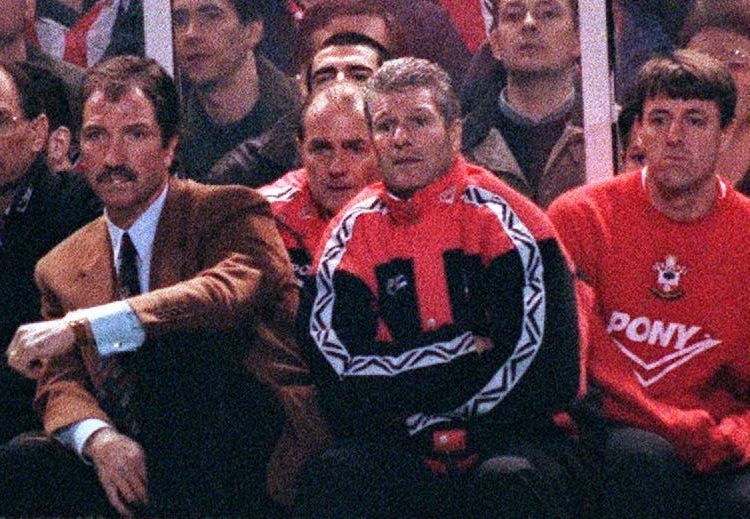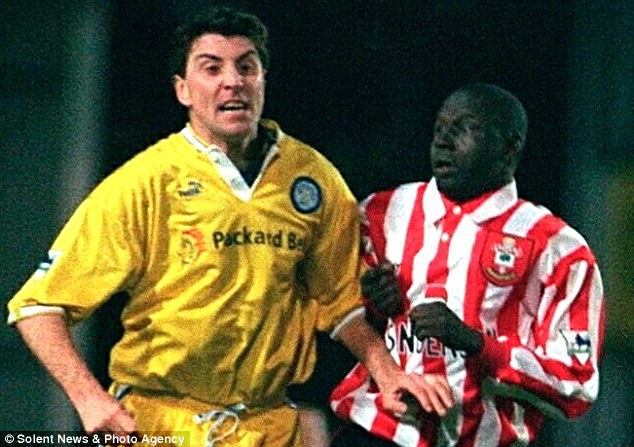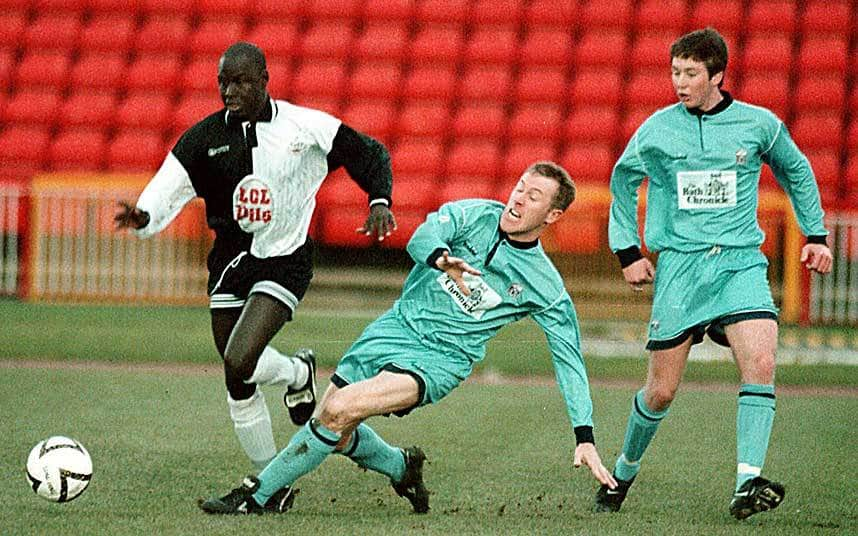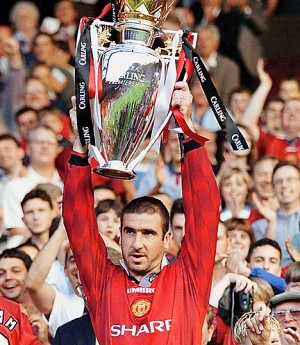The 2017/18 season celebrates 25 years of the Premier League. To mark the occasion we’ll be taking a look at some of the more off-kilter moments from each season. This time out we’re looking at the 1996/97 season and Graeme Souness unearths a gem.
Southampton’s escape on the last day of the 95/96 season was not enough to save David Merrington’s job, and owner Rupert Lowe went in search of a new manager. He happened upon one Graeme Souness. Fresh from enraging half of Istanbul, Souness was tempted back into English football having led Galatasaray to the Turkish Cup in his sole season in charge. The Edinburger had escaped to the Bosphoros in order to resurrect a managerial career that had badly stuttered during his time in charge of Liverpool. Two sixth-placed finishes in the league and half a season in which the Reds were well off the pace were enough for Souness, a singular FA Cup the only positive in a spell which saw Liverpool’s squad bloated by the likes of Neil Ruddock, Julian Dicks, Paul Stewart and Torben Piechnik.
Souness was quick to make his mark on the Southampton squad, bringing Dutch defender Ulrich van Gobbel with him from Galatasaray, whilst also raiding the Norwegian Tippeligaen for defender Claus Lundekvam from SK Brann and forward Egil Østenstad from Viking. These three signings, as well as the loan addition of Eyal Berkovic from Maccabi Haifa, added a continental flavour to a squad that had relied heavily on talisman Matt Le Tissier for the first half of the decade.

Southampton started the season in the same form as they’d spent much of the last – woeful. An opening day draw at home to Ruud Gullit’s Chelsea was followed by five defeats in six, and the Saints quickly found themselves stuck at the bottom of the table along with Blackburn Rovers. An unbeaten run of five followed, with Middlesbrough and Sunderland dispatched 4-0 and 3-0 respectively, and an incredible match against Manchester United at The Dell finishing 6-3 to the hosts, with Berkovic and Østenstad scoring a brace apiece. A crushing 7-1 defeat against Everton at Goodison Park brought Southampton back down to Earth with a bump, and Souness went looking for a player to halt his side’s inconsistency.
Enter Ali Dia.
The Saints manager had been contacted by George Weah, the AC Milan forward and former Ballon D’or winner, who recommended that Souness sign his cousin and former Paris Saint Germain team-mate Ali Dia. Dia, an international with 13 caps, had been playing in the German Second Division the season before and was looking for a new club, and Weah had nothing but praise for the Senegalese striker. Hold on, you might say. He’s the cousin of George Weah, the most famous Liberian man ever, and he’s Senegalese? Well, there’s only 1,000km between the two countries. I suppose it could happen. Souness agreed to bring the 31 year old in on trial to see if he could cut the mustard in the Premier League.
Dia was scheduled to play in a reserve game for Southampton against Arsenal, but as the game was rained off he’d have to prove his worth in training. His first session was on the Friday before Leeds United were due to visit The Dell, and Le Tissier was quick to pass judgement. “I remember at the time thinking: ‘He’s not very good. He’s probably not going to make it.’” recalls the Saints hero. But Le Tiss – this is a striker that’s played for PSG and been capped by Senegal, surely he must have something in the locker? Souness certainly thought so as, due to an injury crisis, Dia was named on the bench the following day.
Thirty-two minutes into the game against Leeds, Le Tissier pulled up with a thigh strain. Souness assessed the options on his bench – this was when matchday squads were capped at 16 players, and he had named only one, albeit barely, recognisable striker amongst his substitutes. Neil Maddison could arguably do a job up front supporting Østenstad, but instead the manager went for the unknown and signaled for Dia to start warming up. One assumes that Graeme Souness fancied himself as a bit of a maverick, planting flags into the centre spot of a bitter rivals pitch, keeping that moustache a decade after it had dropped out of fashion, so why not stick on a striker he’d never even seen play before to replace his team’s most influential player?

Dia came on to much intrigue from the home fans, and had the chance to make an immediate impact with his first touch, and Nigel Martyn saved his toe-poke towards the goal. That would be his total contribution to the Southampton cause. After watching Dia run around like “Bambi on ice” for 53 minutes, Souness substituted the Senegalese for Ken Monkou. By this time Southampton were 1-0 down and would concede another as Leeds ran out comfortable winners. In his post-match interview, Souness was quick to blame anyone and everything but himself for dropping the most hilarious of bollocks, claiming that he didn’t have any strikers and so he was forced to give a debut to a player he’d never seen before.
After leaving the ground that evening, Southampton’s players never saw Ali Dia again. Though he was expected to report to training on the Monday, Dia decided a better idea might be to hot-foot it back up to the North-East, where he had stationed himself after a one-game spell at Blyth Spartans. It quickly became clear that Souness had been had. The man posing as George Weah was Ali Dia’s agent – the real George Weah was quick to distance himself, saying that he had never heard of the player – and astonishingly, Dia had not played alongside Weah at PSG. Nor had he been capped by Senegal. He had been playing in the German Second Division – well, two appearances for relegation threatened VfB Lübeck, in a season where he also made appearances for FinnPa and PK-35 in Finland. None of these clubs were interested in securing his services long term.

In fact, they were part of a long list of clubs that weren’t interested. After his aborted spell at Blyth, Dia’s agent decided it was time to think big so he put on his best Liberian accent and gave Bill Lodey a call. Lodey, the secretary at Port Vale, gave Dia a trial, but he didn’t impress. Then Tony Pulis, at the time manager of Gillingham, received a call from Weah. “I wouldn’t have thought a man like Weah would have heard of Gillingham, but we gave the lad a trial and he was rubbish.” Next, they got Harry Redknapp on the blower. Incredibly, Redknapp wasn’t interested – he saw through the scam from the off. So it was down to Souness to take the bullet, and he’s never lived Ali Dia’s 53 minutes of Premier League football down.
That defeat to Leeds was the second game in a run of eight that would see Saints pick up just three points. At the turn of the year, Southampton were back in 19th but a turnaround in form saw them lose only five of their final eighteen games and once again they survived by the skin of their teeth. Graeme Souness didn’t extend his stay on the south coast beyond one season, citing a difference in opinion on transfers with Rupert Lowe that led to his resignation. He spent four months at Torino the following season before a two year spell at Benfica during which he attempted to turn The Eagles into an early 90’s mid-table Premier League tribute act. He later took the manager’s job at Blackburn Rovers and Newcastle United, further demonstrating his nous in the transfer market by paying £8m for Jean Alain Boumsong, who had joined Glasgow Rangers on a free months previously. After receiving his P45 midway through the 2005/06 season, Souness stepped away from the touchline and has since been seen talking nonsense as a pundit on Sky.
As for Ali Dia? Well he joined Gateshead on a short term deal after the Southampton debacle, playing eight games for The Heed and scoring twice. A further spell at Spennymoor United followed, but Dia retired from football in 1997 to focus on his studies. He graduated from Northumbria University in 2001 with a degree in business.
Southampton’s survival was achieved at the expense of Nottingham Forest, Sunderland and Middlesbrough – the latter relegated by two points having received a three point deduction for refusing to fulfil a game at Blackburn Rovers following an outbreak of flu in the squad. Manchester United’s fourth Premier League title was sealed with a degree of comfort – challenges from Newcastle United, Arsenal and Liverpool were sporadic at best, and the league was sealed with two games to spare. The blossoming of the Class of ’92, as well as 18 goals from Super-Sub Ole Gunnar Solskjaer, helping to bring the title back to Old Trafford for consecutive seasons. But at The Dell, the 1996/97 season will always be remembered for their very own Super-Sub.
